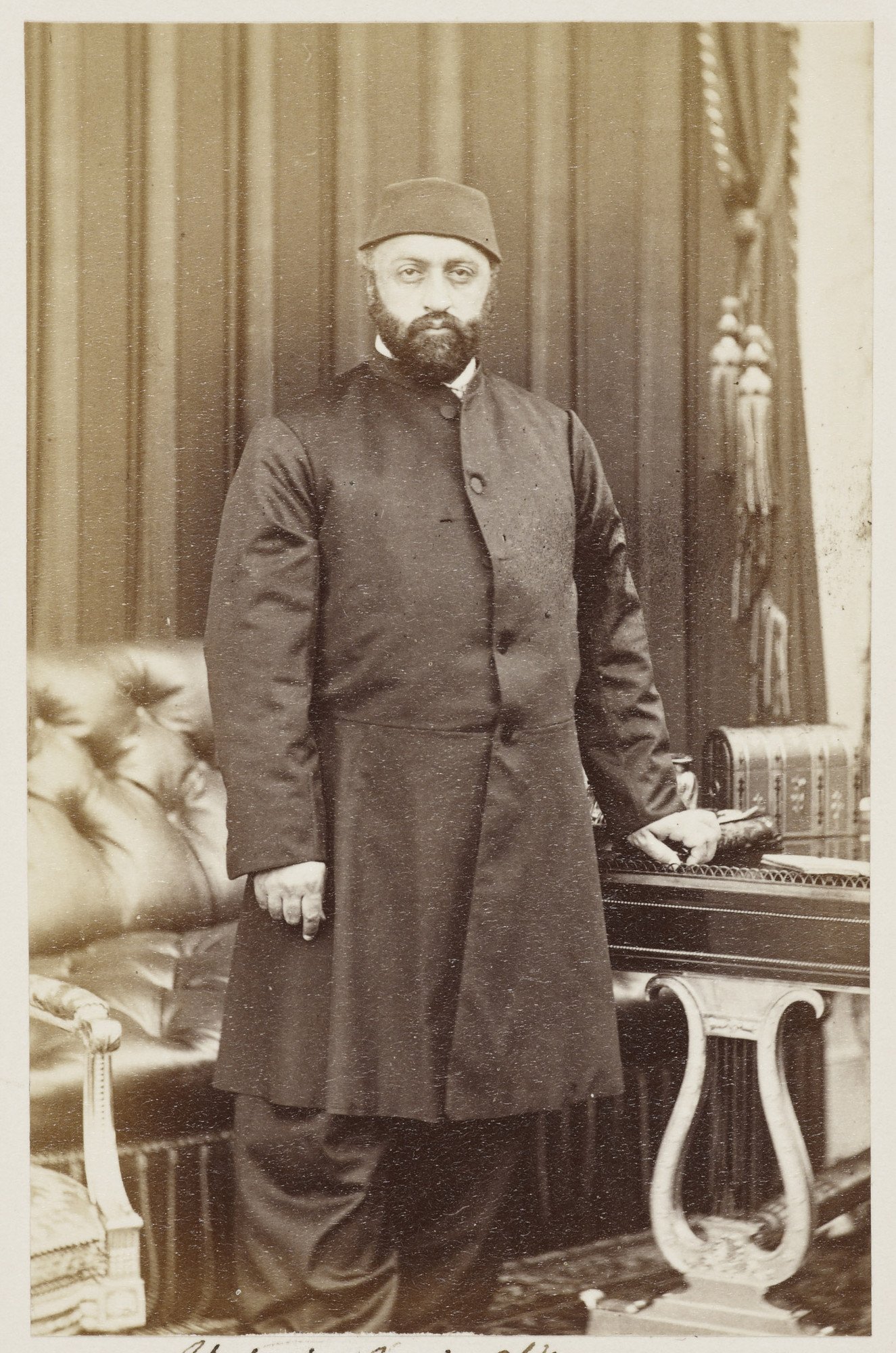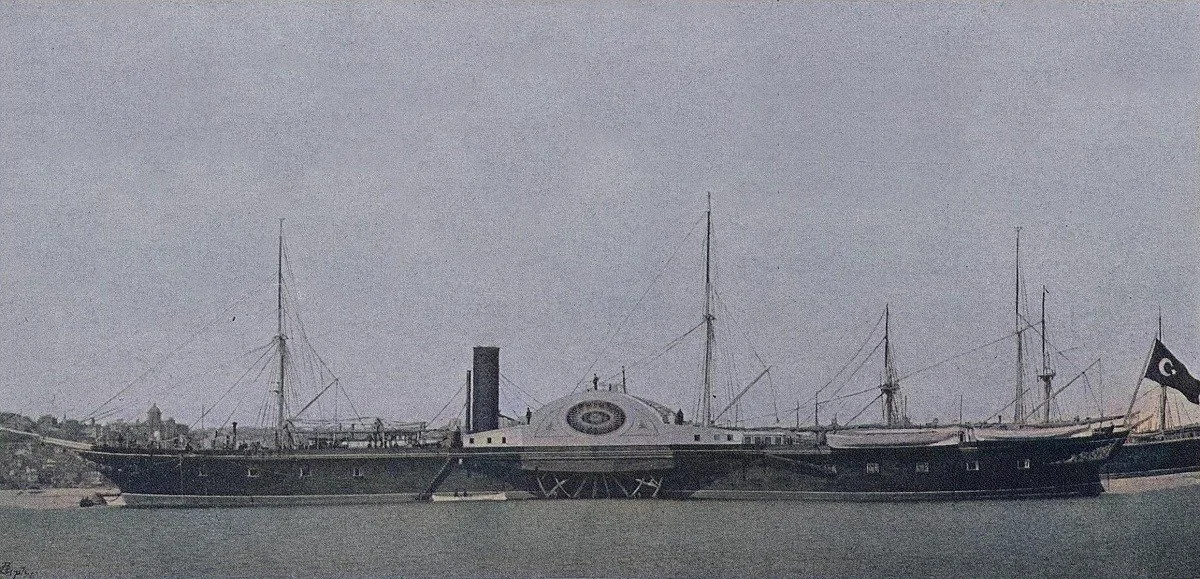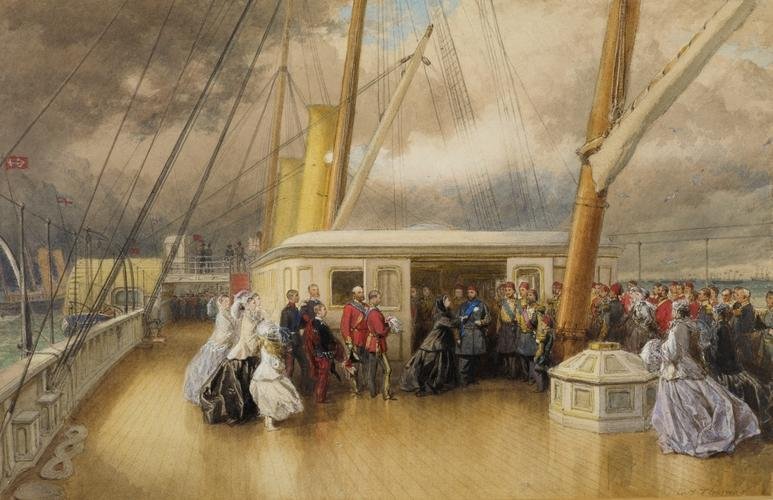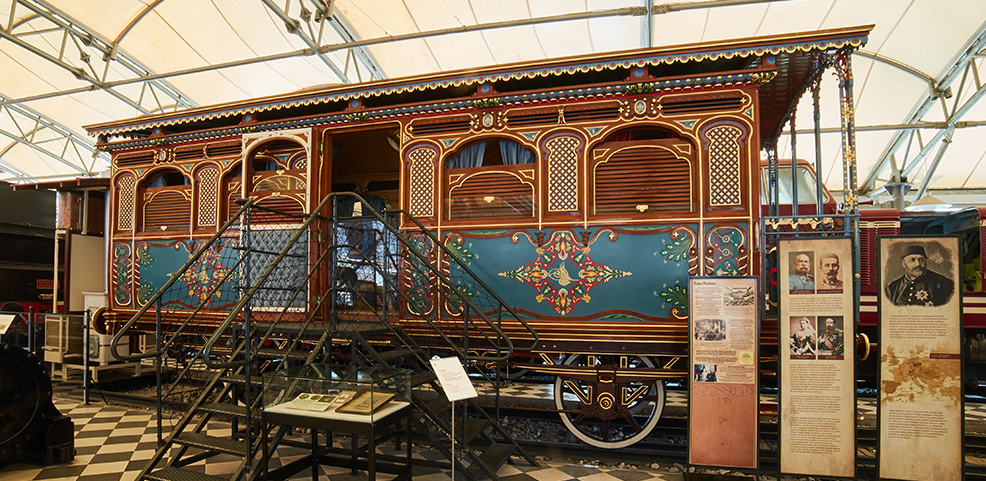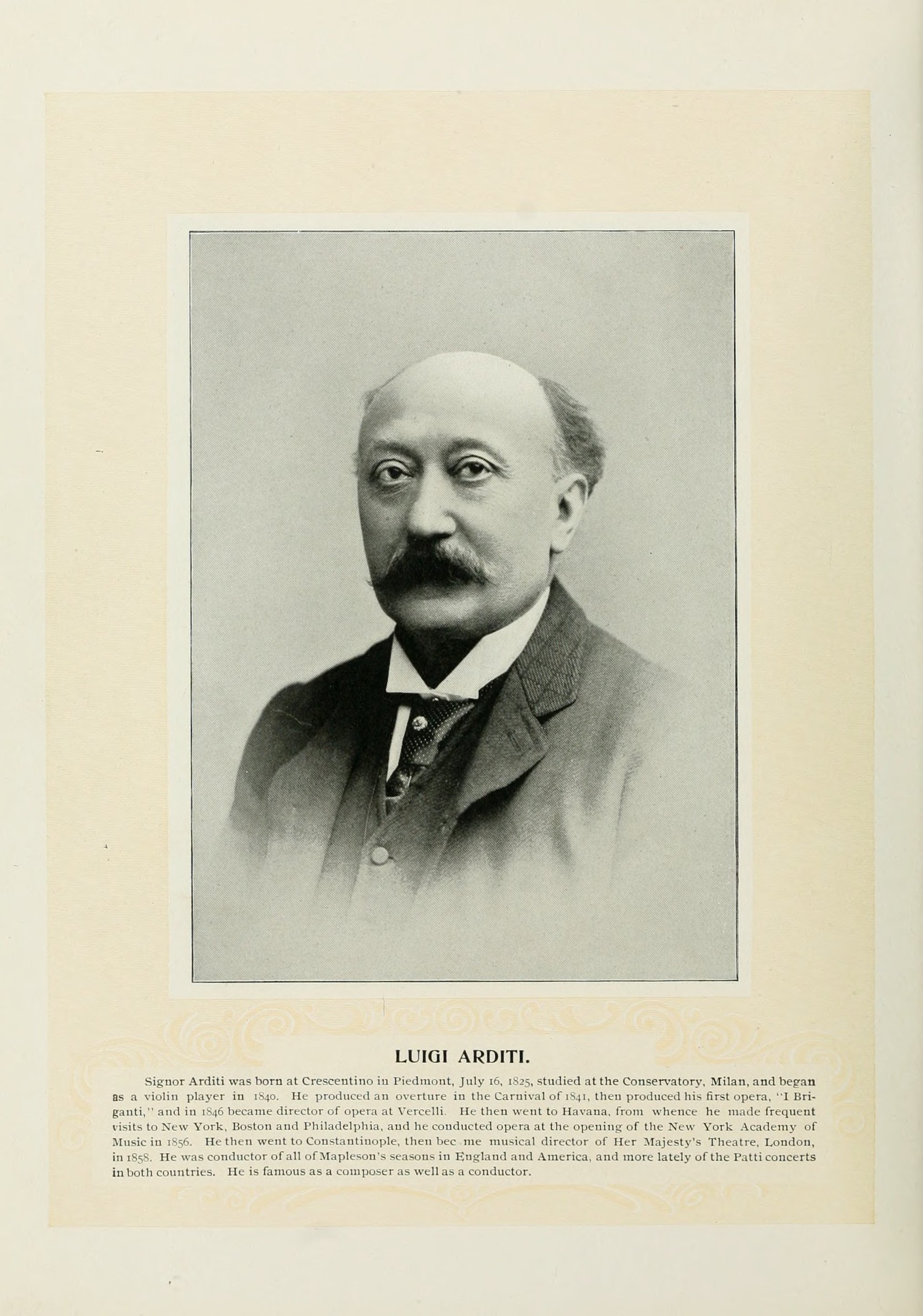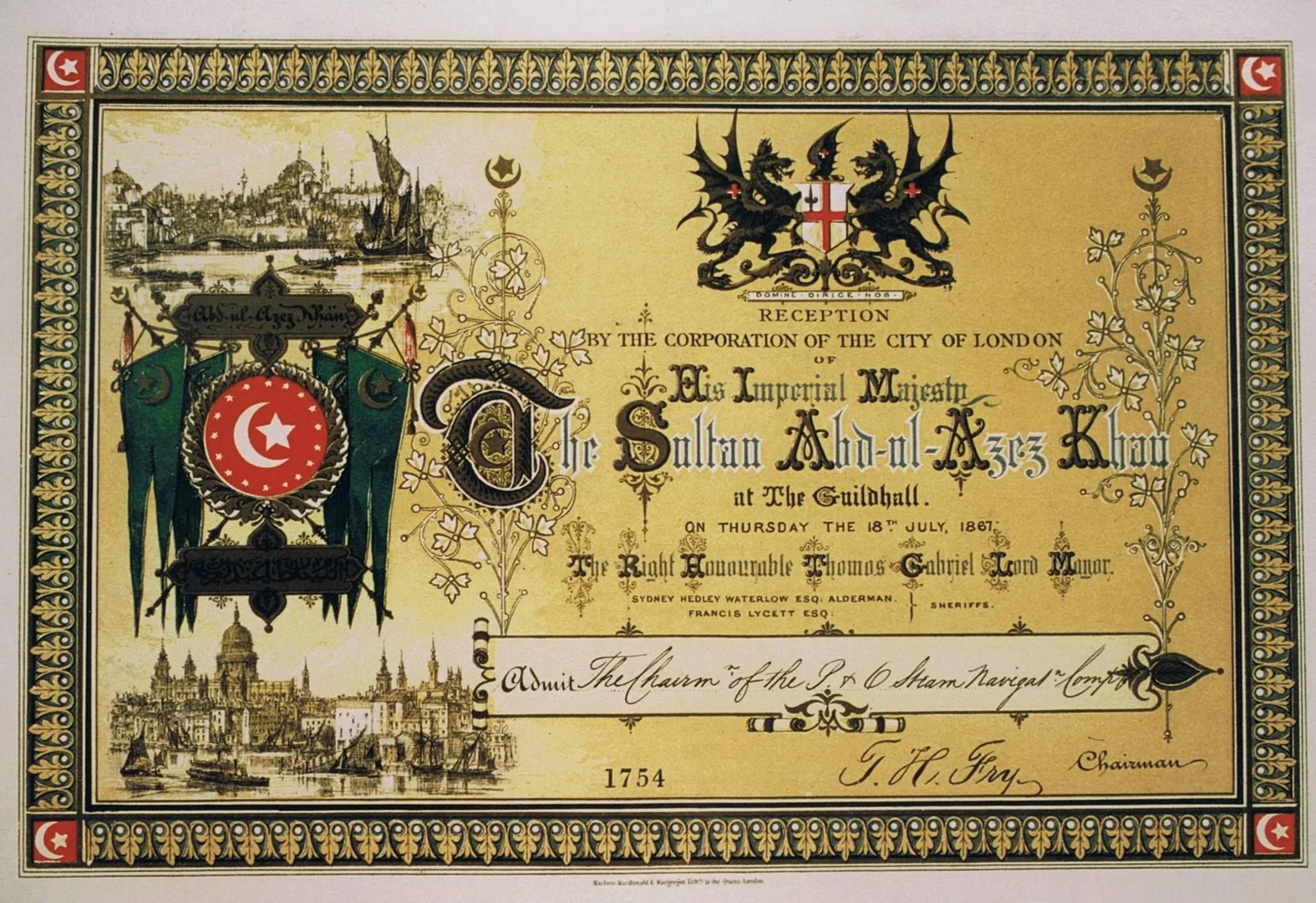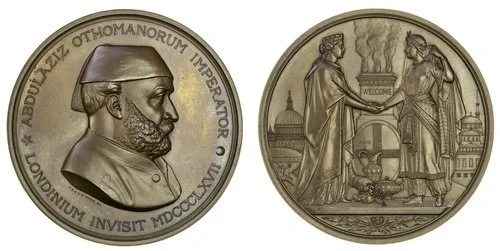Queen Victoria, Sultan Abdülaziz, and the gift that was not a gift
Abdülaziz, the 32nd Ottoman sultan, was a brown-haired, hazel-eyed man with a roundish face underscored by his pointy beard. Like many of his predecessors, he was very fond of oil wrestling and he had the physique to show for it. According to historian Reşad Ekrem Koçu, he was one of the least sultanesque sultans who felt uncomfortable in formal attire and spent most of the day, and even received his ministers in a loose robe. Even his favored, eponymous, low-cut fez looked less regal than the ones his predecessors and successors opted for. This lack of elegance was the reason why his son Abdülhamid, who accompanied him on the journey, feared Abdülaziz would embarrass them all in front of European nobility. He was wrong; Abdülaziz not only managed to refrain from bringing shame to the House of Osman but also left quite a favorable impression on everyone he crossed paths with during the trip.
Sultan Abdülaziz of the Ottoman Empire, source: wikipedia
Abdülaziz was an ardent admirer of Western progress, and it was during his reign that the first railways were built and postage stamps began to be used. He spoke perfect French, and one of his true passions was music. A couple of his compositions, Invitation à la Valse and La Gondole Barcarolle have been included in the album “European Music at the Ottoman Court” by The London Academy of Ottoman Court Music.
A perilous journey almost cut short, thrice
On June 21, 1867, five yachts, including Abdülaziz’s Sultaniye set sail for France. Among the prominent figures accompanying him on the journey were his sons Murad, Abdülhamid, and Yusuf İzzeddin; Minister of Foreign Affairs Fuad Pasha; French Ambassador Nicolas Prosper Bourée; and, the Chief Dragoman of the British Embassy. The convoy arrived off the coast of Toulon on June 30th, when the weather took a turn for the worse. According to Fuad Pasha, Sultaniye started to rock so violently that Sultan Abdülaziz, whose discomfort asea wouldn’t escape Queen Victoria’s notice, ordered the convoy to return to Istanbul at once. Luckily, Fuad Pasha, who had a way with Abdülaziz, convinced the Sultan that doing so would mean nothing less than a diplomatic catastrophe of an unprecedented scale, and the procession soon entered the Toulon port.
Steamship Sultaniye, Istanbul, 1895, source: Ottoman Imperial Archives
The investiture of Sultan Abdülaziz I with the Order of the Garter, 17 July 1867 drawn 1867ö source: Royal Collection Trust
As they were preparing to moor, however, Napoleon III’s fleet fired a 100-gun salute, which, to Abdülaziz’s dismay, caused Sultaniye to lurch again. The sultan was apoplectic; he told Fuad Pasha that he no longer wished to disembark in France and would much prefer if they set sail for England without further ado. Once again, the experienced minister had to make use of his powers of persuasion; at length, he explained to the fuming sultan that choosing not to disembark would not only cause colossal damage to his reputation but would also have a crippling effect on the empire. The threat was averted for the second but not last time.
On July 12th, approximately a fortnight after arriving in France, the sultan and his entourage made their way to Boulogne to board a British barge that would take them to Dover. Now, it was the English Channel’s turn to test Abdülaziz’s patience. The sultan looked genuinely frightened of the high winds and the heavy swell and implored to cancel or at the least postpone the trip. By now, however, Fuad Pasha had become quite accustomed to the sultan’s whims and he only needed to “remind his excellency that Britain was an even bigger ally than France.” Persuaded, but still sulking, Abdülaziz climbed aboard.
“I am very pleased we came”
The Prince of Wales, Duke of Cambridge, Lord Sydney, and Duke of Sutherland greeted Abdülaziz in Dover, and the sultan traveled to London in a carriage built for the occasion by the Birmingham Railway Carriage and Wagon Company. He arrived in Charing Cross later in the day, and the Prince of Wales accompanied him on his way to Buckingham Palace, where he and his entourage stayed during their visit.
Imperial Coach of Sultan, source: Rahmi M. Koç Museums
During his stay, Abdülaziz had a luncheon with Queen Victoria at Windsor Castle, was taken on a walking tour of Teddington and Richmond by the Prince of Wales, and visited the Woolwich Dockyard. On the evening of the 15th, he attended a concert at the Crystal Palace, and on the 16th, he visited the Royal Italian Opera at the Covent Garden. On the 18th, he toured the City and attended a ceremony held in his honor at the Guildhall where he met Benjamin Disraeli, Lord Derby, Lord Stanley, the Duke of Wellington, and Lord Mayor. At the end of the day’s events, he donated 2,500 lira to the Lord Mayor to be distributed among London’s poor.
Luigi Arditi, Italian composer and conductor, source: wikipedia
The Crystal Palace concert included orchestral music from Verdi, Mendelssohn, Mozart, Rossini, and Handel and according to Fuad Pasha, delighted the Sultan. In the Royal Italian Opera, first, a 1000-strong chorus performed An Ode to the Sultan, written by Zafiraki Efendi and set to music by Signor Arditi. Then, the company gave an impressive performance of Daniel Auber’s La Muette de Portici.
Official Visit of His Imperial Majesty, the Sultan Abdulaziz Khan at the Guildhall, London, 18 July 1867, source: pinterest
The only event that marred the otherwise delightful visit occurred on the 19th, during a dinner party held at the India House. After the guests had their supper and were making their way to the ballroom, Ottoman Ambassador Musurus Pasha’s wife literally “dropped dead.” Her passing threw gloom over the rest of the visit, but Abdülaziz was very happy with the journey overall. “I am very pleased we came,” he confessed to Fuad Pasha on their way back to Istanbul – however, it wasn’t just the visit but what he received during it that actually delighted him so.
When is a gift, not a gift?
Two weeks before their departure, Fuad Pasha notified his British counterpart Lord Stanley that receiving the Order of the Garter – the most senior and oldest order of knighthood in Britain – was a requisite of Abdülaziz’s London visit. Lord Stanley welcomed the idea, as he believed that his government had to take all the steps necessary to maintain Britain’s privileged status in Constantinople.
Victoria, however, was not pleased: the order was a gift she and she alone could give, and Abdülaziz’s reversal of the gift-giving process was quite unsettling. In an attempt to regain some control over the gift, she suggested Lord Stanley and Lord Northcote offer the Sultan the Star of India, which was “more suited for those who are not Christians.” She was mistaken in believing that she could reverse her Ottoman counterpart’s reversal. Abdülaziz was adamant: he was to be presented with the Garter, or else.
“This ribbon was handed to me by the Queen, and I am never going to wear another.”
And so, she caved in, and on the 17th, the two royals got together on the Albert and Victoria off the coast of Portsmouth for the investiture of Sultan Abdülaziz with the Order of the Garter. As the ceremony got underway in the “midst of the howling of a storm,” Victoria realized that there was no ribbon ready for the Sultan’s order. So, she took Prince Louise of Hesse’s ribbon and told the Sultan that once one was available, he could return the Prince’s. Abdülaziz, however, proved unwilling: “This ribbon was handed to me by the Queen, and I am never going to wear another.”
Struck on the occasion of Sultan Abdülaziz’s visit to London by Joseph Shepherd Wyon Britannia, standing before an altar decorated with the city shield, welcomes the Ottoman figure. In the background are St. Paul’s Cathedral and Hagia Sophia. Source: spink.com
“On the contrary. It proves you are willing to lend an ear to all things Ottoman.”
Later, the two engaged in a small conversation whereby Abdülaziz managed to impress the Queen and her entourage with a display of wittiness – frankly – unexpected of him. Victoria told him that Sultan Abdülmecid had presented her with a diamond-encrusted brooch some time ago but, because she preferred earrings, she had the Court Jeweler remove the diamonds and make the pair of earrings she was wearing on the day. She added that she hoped the Sultan wouldn’t construe this as an insult. Sultan Aziz smiled and replied, “On the contrary. It proves you are willing to lend an ear to all things Ottoman.”
Further readings
Ali Kemali Aksüt. Sultan Aziz’in Mısır ve Avrupa Seyahati. Ahmet Sait: Istanbul. 1944
Earl of Malmesbery. Memoirs of an Ex-Minister. Longmans: London. 1885
Robert Wilson. The Life and Times of Queen Victoria. Cassell & Co.: London. 1887
Queen Victoria in her Letters and Journals: A Selection. Viking: New York. 1985

